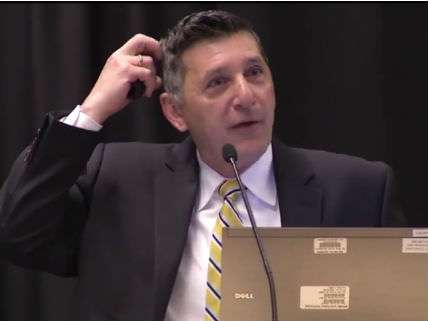The White House's Head-Scratching Defense of Pot Prohibition

Did you know that the Office of National Drug Control Policy (ONDCP) issued an official response to Sunday's New York Times editorial urging Congress to repeal the federal ban on marijuana? You did not miss much. The ONDCP says marijuana must remain illegal because "marijuana is addictive," because "drugged driving is a threat to our roadways," because "marijuana use affects the developing brain," and because "substance use in school age children has a detrimental effect on their academic achievement." Washington Post blogger Christopher Ingraham judges this response "surprisingly weak," noting that "it's built on half-truths and radically decontextualized facts." NORML's Paul Armentano calls it "utterly pathetic," while New York Times editorial writer David Firestone points out that the ONDCP is statutorily obligated to oppose legalization, regardless of the facts. That provision applies only to Schedule I drugs, so one benefit of moving marijuana to a less restrictive category might be smarter, more nuanced arguments from the beleaguered pot prohibitionists at the ONDCP—a possibility they are not allowed to discuss.
Or maybe this is about as smart as the case for prohibition gets. The ONDCP statement exhibits two classic flaws of prohibitionist arguments: 1) the failure to justify the legal distinction between alcohol and other drugs, and 2) the failure to justify (or even acknowledge) the use of force to stop people from consuming psychoactive substances that politicians do not like. As Ingraham notes, all of the administration's concerns about marijuana apply with equal or greater force to alcohol, which President Obama himself admits is more dangerous than marijuana. If these concerns do not justify the prohibition of alcohol, how can they justify the prohibition of marijuana?
As usual, the White House glosses over what that policy means in practice. "The Obama Administration approaches substance use as a public health issue," the ONDCP says, "not merely a criminal justice problem." But no amount of quasi-medical rhetoric can make up for the violence inherent in this system. As long as the government tries to forcibly prevent consensual transactions, it will be locking people up (and occasionally killing them) for things that should not be crimes.
"We agree that the criminal justice system is in need of reform and that disproportionality exists throughout the system," the ONDCP says. "However, marijuana legalization is not the silver bullet solution to the issue." For the record, the ONDCP also rejects the idea that legalization is a "panacea." The ONDCP is right on both counts: Marijuana legalization is neither a silver bullet nor a panacea. It nevertheless would be better than prohibition, which is the issue I thought we were discussing.
